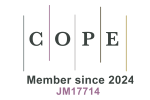Webinar series ‘How to conduct and publish excellent research on traffic safety’—part 5
The upcoming speaker is Lars Ekman, traffic safety expert at Swedish Transport Administration (recently retired).
The Traffic Safety Research (TSR) journal highly values time and efforts invested by the peer reviewers. With your help, we make sure that the quality of our publications meets the highest standards set for scientific research.
Below, you can learn more about:
We highly recommend reading the instructions below, but also—especially for young career researchers—spend some time on general education in how to make good peer reviews. Some resources to start with are:
Please, consider the following:
The inspiration for these guidelines came to a high degree from the ‘Ethical guidelines for peer revieweing’ provided by the Committee on Publication Ethics (COPE).
Remember that the editor requires a fair, honest, and unbiased assessment of the strengths and weaknesses of the manuscript. Even though you can provide comments visible to the editor only, most of the feedback should be put in the text that the authors will see. Confidential comments should not be a place for denigration or false accusation, done in the knowledge that the authors will not see them.
All communication between the parties of the editorial process must be done in a professional manner, using appropriate language, and with due respect. To promote transparency, communication should be restricted to the official channels, such as the submission-specific discussions within the journal software system and/or using professional emails.
As a reviewer, you should inform the editor about competing interests that might influence your judgement. Competing interests may be personal, financial, intellectual, professional or political in nature. If you are (or have been recently) employed at the same institution as any of the authors, involved in mentorship relations, close collaborations or joint grant holding, you should not agree to review.
Competing interest does not mean that objectivity of your review is affected, but rather that it can be perceived as affected. As a rule of thumb, you should disclose any relations that, if discovered at a later stage, may cause you embarrassment.
You should not agree to review a manuscript just to gain sight of it with no intention of submitting a review, or agree to review a manuscript that is very similar to one you have in preparation or under consideration at another journal.
A reviewer should treat the manuscript as a confidential document. This means you can’t share it with anyone without authorization from the editor. You must not share information about the review itself either.
The following applies:
There should be none, simple as that, during the entire review process. The communication with authors is handled by the journal.
Your comments and decision on the manuscript should not be affected by the knowledge of the authorship or the origin of the manuscript.
In case you suspect that some misconduct took place, either in the research itself or during the manuscript writing and submission, inform the editor immediately. It is appropriate to cooperate, in confidence, in the journal investigation, but do not personally take further actions unless we ask you for additional information or advice.
Read more about how allegations of misconduct are treated by the TSR journal here.
The TSR editorial team monitors developments around generative AI and AI-assisted technologies in scientific publishing domain. It is most likely that the current policy regarding their usage will require adjustments or refinements in the future.
Responsibility. Reviewing a scientific manuscript implies responsibilities that can only be attributed to humans. Critical thinking and original assessment needed for peer review is beyond the scope of today's generative AI technology which may suggest incorrect, incomplete, or biased conclusions about the manuscript. The reviewer is responsible and accountable for the content of the review report.
Manuscript under review. A reviewer is obliged to respect the confidentiality of the manuscript they are reviewing. It is therefore not allowed to upload the manuscript, or any part of it, into generative AI tools since this may violate proprietary and privacy rights of the authors or other persons mentioned in the manuscript.
Review report. This confidentiality requirement extends to the peer review report, as it may contain confidential information about the manuscript and its authors. Reviewers should not upload their peer review report into an AI tool, even if it is just for the purpose of improving language and readability.
The policy regarding generative AI usage for authors can be found here.
The review consists of several predefined questions and a free text part. The predefined questions reflect the aspects that the editorial team considers important in deciding whether a paper should be published or not.
The free text part should include the following components:
Consider specifically the following aspects of the work under review:
An example of the TSR review form can be downloaded here.
Reviewers may register their contributions at the ReviewerCredits, a platform to certify, measure and reward peer review activities. Read more about the benefits of the registration and the practical steps involved here.
The open peer review format applied by the TSR ensures that reviewers are named in the published papers.
Once you have completed your review, the following happens:
The upcoming speaker is Lars Ekman, traffic safety expert at Swedish Transport Administration (recently retired).
|
ISSN 2004-3082 (online) Editor-in-chief: |
 |
